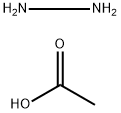A7112012
Rhodium(II) acetate dimer , RH:43.0%-46.6% , 15956-28-2
Synonym(s):
Dirhodium tetraacetate;Rh2(OAc)4;Tetrakis(acetato)dirhodium(II)
CAS NO.:15956-28-2
Empirical Formula: C8H12O8Rh2
Molecular Weight: 441.99
MDL number: MFCD00003538
EINECS: 240-084-8
| Pack Size | Price | Stock | Quantity |
| 100MG | RMB959.20 | In Stock |
|
| 250MG | RMB1919.20 | In Stock |
|
| 1G | RMB5359.20 | In Stock |
|
| 5G | RMB14959.20 | In Stock |
|
| others | Enquire |
Update time: 2022-07-08
PRODUCT Properties
| Melting point: | 205 °C |
| storage temp. | Inert atmosphere,Room Temperature |
| solubility | Methanol + Water (Slightly) |
| form | powder |
| color | Green to dark green |
| Water Solubility | Soluble in aqueous solution like water. Slightly soluble in ethanol |
| Hydrolytic Sensitivity | 0: forms stable aqueous solutions |
| Exposure limits | ACGIH: TWA 0.01 mg/m3 NIOSH: IDLH 2 mg/m3; TWA 0.001 mg/m3 |
| Stability: | Hygroscopic |
| InChIKey | ANSVJOOIUURYRN-UHFFFAOYSA-N |
Description and Uses
Rhodium (II) Acetate Dimer is a effective catalyst for ylide formation and it is also catalyst for cyclopropanation of alkenes, oxidation of alcohols, cyclization reactions involving -diazo carbonyl groups, insertion into C-H and X-H bonds (X-H is NH or SH or OH). More reactive and useful in differentiating ribonucleosides and deoxynucleosides. It is also used in functionalizing fullerenes into polymers. Efficient catalyst for hydrogen transfer from 2-propanol to cyclohexanone and other unsaturated compounds.
Safety
| Symbol(GHS) |  GHS07 |
| Signal word | Warning |
| Hazard statements | H315-H319 |
| Precautionary statements | P302+P352-P305+P351+P338 |
| Hazard Codes | Xi |
| Risk Statements | 36/38 |
| Safety Statements | 37/39-26-15 |
| WGK Germany | 3 |
| RTECS | VI9361000 |
| TSCA | No |
| HS Code | 28439000 |





